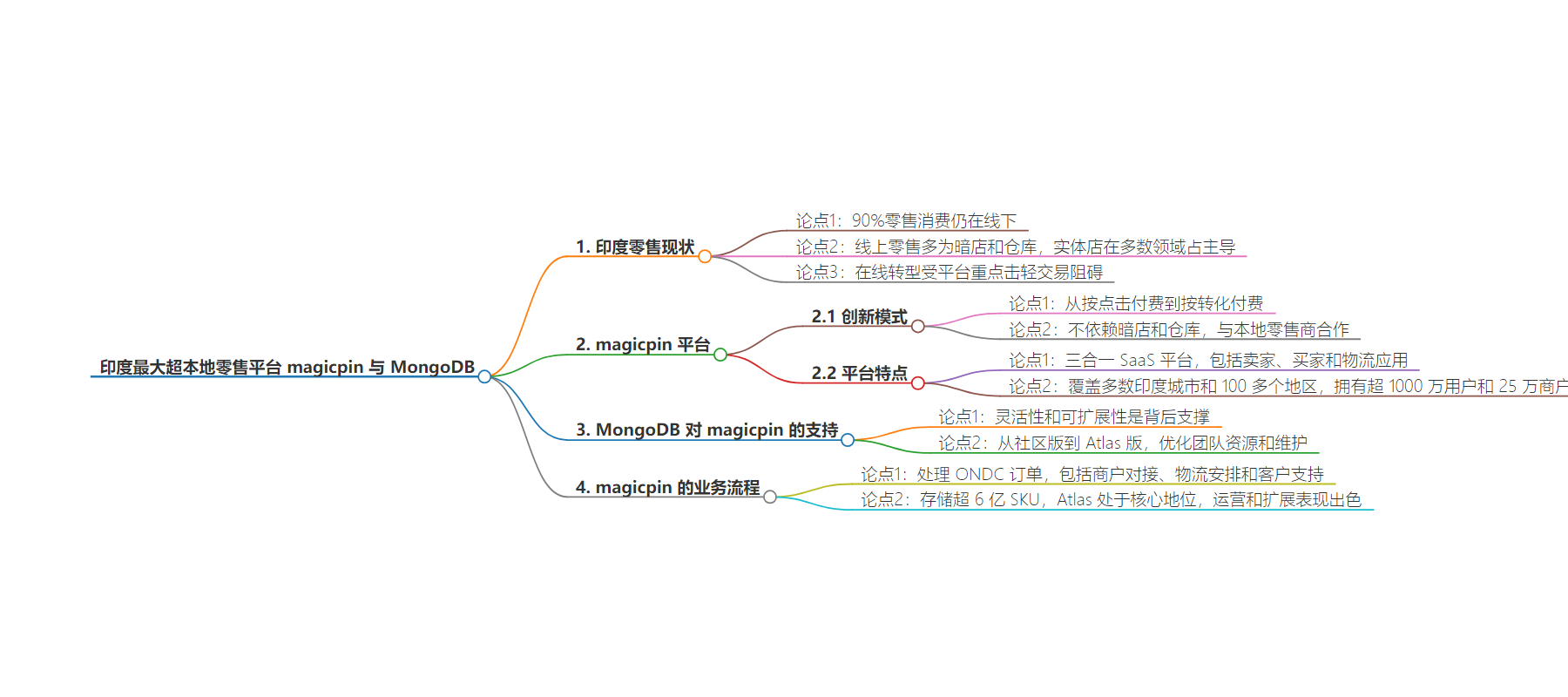包阅导读总结
1. 关键词:magicpin、Hyperlocal Retail、MongoDB、India、Pay-per-Conversion
2. 总结:magicpin 是印度最大的超本地零售平台,采用新的按转化付费策略,不依赖暗店和仓库,与当地零售商合作,拥有超千万用户和众多商户,其背后依靠 MongoDB 的灵活性和可扩展性,使用 MongoDB Atlas 助力发展。
3. 主要内容:
– magicpin 是印度最大的超本地零售平台,印度零售消费大多在线下,其改变了传统的按点击付费模式,采用按转化付费策略。
– 它是三合一的 SaaS 平台,包括卖家、买家和物流应用,用户超千万,涵盖多数印度城市和众多地区,有 25 万商户,涉及多个品类。
– 从 2015 年创立起,MongoDB 的灵活性和可扩展性是其强大支撑。起初使用社区版,后因需求改用 MongoDB Atlas。
– 它处理大量 SKU,管理 SaaS 平台等,MongoDB Atlas 处于核心地位,带来高可用性、良好的监控和路由,使运营和扩展更顺畅。
思维导图:
文章来源:mongodb.com
作者:MongoDB Blog
发布时间:2024/7/19 13:31
语言:英文
总字数:601字
预计阅读时间:3分钟
评分:80分
标签:超本地零售,MongoDB,按转化付费模式,SaaS 平台,印度
以下为原文内容
本内容来源于用户推荐转载,旨在分享知识与观点,如有侵权请联系删除 联系邮箱 media@ilingban.com
Despite its trillion-dollar economy, 90% of retail consumption in India still takes place offline. While online retail in India has grown in recent years, much of it still consists of dark stores (a retail outlet or distribution center that exists exclusively for online shopping) and warehouses, the majority of retail establishments—fashion, food, dining, nightlife, and groceries—thrive as physical stores. What’s more, businesses looking to transition to online models are hindered by major platforms that focus primarily on clicks rather than encouraging transactions.
This opportunity was the inspiration for the founders of magicpin, India’s largest hyperlocal retail platform. magicpin has revolutionized the conventional pay-per-click model, where businesses bid on keywords or phrases related to their products or services and then pay a fee each time someone clicks on an ad, with a new pay-per-conversion strategy. In a pay-per-conversion model, businesses only pay when they make an actual sale of a product or item. magicpin does not rely on dark stores, warehouses, or deep discounting; instead, it collaborates with local retailers, augmenting foot traffic and preserving the essence of local economies. This unique model ensures that consumers not only enjoy existing in-store benefits, but also receive additional perks when opting to transact through magicpin.
“We enable the discovery of those merchants,” says Kunal Gupta, senior vice president at magicpin. “Which merchants in your local neighborhood are selling interesting stuff? What’s their inventory? What savings can we offer to buyers? We have data for everything.”
Effectively three SaaS platforms in one, magicpin is a seller app, a buyer app, and a developing logistics app on the Open Network for Digital Commerce (ONDC), which is backed by the Indian government. With over 10 million users on its platform (covering the majority of Indian cities and over 100 localities), magicpin has established itself as a leading offline retail discovery and savings app. magicpin currently has 250,000 merchants in categories ranging from food to fashion to pharmacy.
The power behind magicpin has always been MongoDB’s flexibility and scalability. And from the company’s start in 2015, it became clear that magicpin was on to something special.
“In the first week of March 2023 when we onboarded ONDC, we hit almost 10,000 transactions a day. In October last year, we peaked at 50,000 orders in a single day, which is a huge milestone,” says Kunal.
“When an ONDC order is placed, it flows through us. We manage the entire process—from sending the order to the merchant, assigning logistics personnel for pickup and delivery, to handling any customer support tickets that may arise. It’s the seamless integration of these elements that defines our contribution to the intricate framework of ONDC.”
Having launched using the community version of MongoDB, Kunal realized that magicpin needed to make better use of its relatively lean tech team and allow them to focus more on building the business. He also saw that a managed service would be a more effective way of handling maintenance and related tasks.
“We realized there had to be a better solution. We can’t afford to have all the database expertise tied up with a team that’s focusing on creating businesses and building applications,” said Kunal. “That’s when we started to use MongoDB Atlas.”
magicpin uses a multitude of technologies, to store over 600 million SKUs, and handle its SaaS platform, session cache, card, and order management, and MongoDB Atlas sits at the heart of the business.
“For our operational and scaling needs, it’s seamless,” Kunal concludes. “Availability is high, and monitoring and routing are super-good. Our lives have become much easier.”
